Official blog of the newsletter Socratically.https://socratically.net
Don't wanna be here? Send us removal request.
Text
Gatekeepers and Snobs: A discussion about Fandoms and their protectors
Or, How To Ruin Enthusiasm For A Community
Gatekeepers ruin everything; they will always be there, waiting in the shadows to tell you how you aren’t really that into something—or letting you know that what you like isn’t respectable enough to be a fan.
We have all experienced it, no matter what community it is, no matter what kind of fandom. You will always have someone trying to gatekeep what it means to be a fan—telling you the barrier you have to meet in order to “really” appreciate something.
“Oh, you’re a fan of Nirvana? name 3 songs right now.”
“You aren’t a gamer if you just play Animal Crossing and The Sims.”
If you follow me on @Threads, you may have seen one of my posts get a bit more attention than normal. In it, I discussed an interaction I had a few years ago with a coworker at an old job.
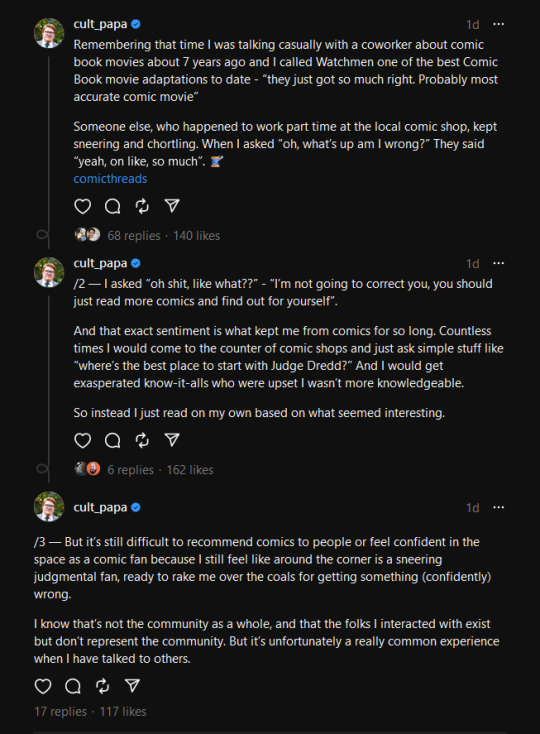
This seems to have resonated with a few people, and it’s easy to see why. Well, actually, it’s not because I don’t understand why people pay attention to me, but still—people have experienced this in a variety of situations. Hell, there is even a Simpsons character based specifically on this type of person:

“I’m not going to correct you, you should just read more comics and find out for yourself”
That sentence in particular is really what has allowed the interaction to remain in my mind for so long. The idea that I was either so wrong it would be too much work to correct me, or that I was such a “fake fan” I wasn’t worth correcting. In either scenario, it’s the wrong way this situation could have been handled, regardless of your vitriol for my admittedly bad opinion.
Geez Did They Miss the Point
Something that struck me quite odd, though, was how much of my comments section for that post was stuck debating whether or not Watchmen was a good movie or faithful. Perhaps it wasn't clear enough, but the point wasn’t about Watchmen at all; it was about the behavior.
I don’t care if you liked the movie or not. If you took my post about gatekeeping based on opinion and decided to be condescending about the opinion that was being gatekept? Guess what? you are a gatekeeper! Congrats!
It truly can’t be stressed enough that you are telling on yourself if you couldn’t move past the offhanded take. It was bait, and you fell for it. Just like Zack Snyder supposedly couldn’t understand the social commentary being told in the Comic Book when he made his adaptation, you too couldn’t pick up on the overall theme of the post. Stuck on the proverbial artwork in the background rather than the story on display.
The point of the post, and thankfully what was picked up on by plenty of folks, was the behavior on display. I was conveying an experience that ultimately hurt my enthusiasm for the medium while simultaneously discussing gatekeeping in general.
Enthusiasm, Not Disdain
When someone reveals to you that they are either not as well versed or just starting their journey into a specific fandom or piece of media, the correct course of action, if you think they are missing some crucial piece, is to respond enthusiastically.
Someone in the comments of my Threads post, who has since deleted their comment, so I am heavily paraphrasing based on bad memory, said something along the lines of “the barrier for fandom is too low. Too many people who have no idea about the material claiming to be fans. I’ve met Star Trek “fans” who didn’t even recognize the Original Series theme song.”
To read more, go to my newsletter by clicking the link below!
#newsletter#fandom culture#fandom#fandom problems#gatekeepers#snobs#star trek#twilight#misogyny#sexism#threads#ghostbusters#ghostbusters 2016
3 notes
·
View notes
Text
You Should Get Familiar With Filial Responsibility Laws
The state could force you to pay for your parents medical debts.
By Stewie Stewart
Hey Socratically Readers! Longtime no see. Apologies for the gap in posts for a bit there; back-to-back colds and then the flu really knocks you down a peg. Before we begin consider subscribing to this blog or my official newsletter Socratically.net. Now, let’s dive into one terrifying prospect—Being forced to financially support your parents by the State.
It was recently reported that “Baby boomers are becoming homeless at a rate ‘not seen since the Great Depression’“. While a tragic prospect of an increasing homeless population even above our predicted rates, it also raises another warning for the families of that generation—specifically Gen X and Millenials. You might soon have to bear responsibility for those aging parents due to Filial Responsibility Laws. Filial Responsibility Laws are laws designed to impose legal obligations on adult children to take care of their parents’ basic needs and medical care.

Currently, these laws have remained somewhat dormant for the last couple of decades thanks to advancements in welfare and healthcare accessibility. The only states with relatively active use of these laws are Pennsylvania, which has one of the oldest and most broad Filial laws, and South Dakota.
As those programs continue to be underfunded or, in the case of most Republican budget proposals, outright removed, you will start to see these forgotten laws start to pick up more steam as state governments aren’t able to pick up the tab on the growing financial needs of the aging population—and instead force you to pony up for your parent’s debts.
Stewie, I think you are being an alarmist!
Do you think so? I thought so too, so let’s do a thought exercise; imagine that you, like many of the current Millennials and Gen-Zers, have cut the proverbial cord on your parents. No contact, low contact, however you might classify it, your relationship with one or both of your parents is strained—a not uncommon phenomenon amongst the current generations.
In the United States, roughly 1 in 4 adults are estranged from their parents, up from the 7% estranged from their mothers and 22% estranged from their fathers, as reported in a study performed in 1997. This rift is caused for a variety of reasons;
Childhood Abuse
Sexual Abuse
Difference in Values
Lack of Support
This growing trend of separation is all part of the effort to break down the compulsory inherent loyalty to your parents for the simple act of birthing you or raising you. It is an obligation mandated to them by law and something expected societally, so to expect an eternal reward with no consequences for bad behavior is a form of entitlement to an extreme degree.
Now imagine those aging parents falling on hard times, even becoming homeless, turning to the state for financial and medical support, and the state instead turns to you. Suddenly, you are burdened with their medical care costs, housing costs, and general financial responsibility. Maybe if you are lucky enough not to make enough money, the state won’t be able to foist this on you, but if you were able to somehow carve out a successful life for yourself? Well, strap in because you are now fully responsible for your aging parents’ increasingly expensive care—and the state will ensure you pay for that care.
Look A Court Case Proving My Point…
In 2012, a case was brought to the Pennsylvania Superior Court: Health Care & Retirement Corporation vs. Pittas. In this case, the court held that John Pittas was liable for his mother’s nursing home bill totaling $93,000. John’s mother had left the country along with other members of his family to return to Greece, leaving behind the aforementioned bill at her former Nursing home. John, being the only remaining family member in the US, was then sued by the Nursing Homes parent company. The Superior Court held that the son had sufficient financial ability to support his mother, and Pennsylvania’s filial support statute does not require other possible sources of income to be considered before proceeding against one of the relatives listed in the statute. Lastly, the evidence presented was sufficient to support a finding that the mother was, in fact, indigent.
John Pittas’ mother entered a nursing home for rehabilitation following a car crash. Upon recovery, she left the nursing home and moved to Greece with her husband and adult daughters, and a large portion of her nursing home bills went unpaid. As a result, the nursing home instituted a filial support action against Mr. Pittas, the only child still living in the United States, for nearly $93,000, under Pennsylvania’s filial support law.
While John initially prevailed before a panel of arbitrators, the nursing home appealed, and the trial court ruled in favor of the nursing home. John appealed the decision to the Superior Court of Pennsylvania, arguing that the trial court improperly placed the burden upon him to prove his inability to financially support his mother. The nursing home presented four years of John Pittas’ individual and “S” corporation joint tax returns and bank account statements. The nursing home also elicited testimony from John that his net income was in excess of $85,000 (recall, this was decided in 2012). John testified that he could not financially support his mother because of other bills, but he failed to substantiate those other bills. Ultimately, the trial court found his testimony lacked credibility and that he had the financial ability to support his mother.3
The second issue raised on appeal was whether the trial court abused its discretion in refusing to consider alternative sources of income available to John’s mother before finding John liable to the nursing home. 4According to John, before finding him liable, the trial court was obligated to consider other income sources, such as his mother's husband, her two other grown children, and her application for medical assistance that was pending (on appeal) at the time. The Superior Court held that “the filial support statute does not require a trial court to consider other sources of income or to stay its determination pending the resolution of a claim for Medicaid.”5 The nursing home had the ability to choose which family members to pursue for the outstanding debt. The court concluded that if John wanted other family members to share in the burden, he should have brought them into the case as third-party defendants.6
The final issue raised on appeal by John claimed the nursing home presented insufficient evidence for the trial court to find the mother “indigent.” The statute is silent as to the definition of indigent, so the Superior Court applied the common law definition. The court found the meaning of indigent “includes, but is not limited to, those who are completely destitute and helpless. It also encompasses those persons who have some limited means, but whose means are not sufficient to adequately provide for their maintenance and support.”7 The nursing home argued that the mother’s bank statement established the amount of social security income received and her share of her husband’s Veteran’s Administration benefit. This showed that the mother’s income was limited to $1,000 a month, an insufficient amount to provide for her maintenance and support, according to the court. John argued that the nursing home needed to present more evidence of his mother’s indigence, but he failed to establish that any such evidence existed. Therefore, the Superior Court held that the mother was indigent and her son was liable for her nursing home bills.8
While this is just one case in a state with a much broader application, let’s look at how those laws are applied in states like New Hampshire, Vermont, or Louisana.

New Hampshire’s Filial Laws are also kind of crazy.
Within New Hampshire, you may be subject to NH Statute 167:2—This statute dictates that your parents or even step-parents, permitting that step-parent provided care for you while you were under 18, could cause one of these Filial Responsibility Laws to go into effect permitting “weekly income or other resources are more than sufficient to provide a reasonable subsistence compatible with decency and health.”
The definition of “more than sufficient” is not defined at all, meaning it would be up to you, as a defendant, to provide a compelling argument to the court that you could not feasibly afford to bear financial responsibility for your parents. Refusal to pay could result in 60 to 90 days of prison as well as a requirement to pay the assistance that is being refused.

How about Vermont? Worse you say?
Vermont state statute 15 V.S.A. § 202 states that when an individual is found to have deserted or refused to support a relative in need, including spouses and adult children. An adult child who unreasonably neglects a parent in need could be imprisoned for up to two years and/or fined up to $300.00.
This law does have a silver lining in its ability to protect Spouses and Children who are unceremoniously abandoned by their parent/partner if they are being left without providing support or leaving them destitute. So that’s something, I guess.

Okay, but that’s got to be the worst one, right? Louisiana too? ALIMONY??
Louisiana might just be the worst one because it isn’t defined based on poverty but rather treats your parents and grandparents with the same responsibility as divorcees, requiring you to pay alimony.
Louisiana LA Rev Stat § 13:4731 “Alimony for support from children or grandchildren” provides that an individual in need may seek alimony from children or grandchildren, enforceable by the law. Further, both parents and adult children have the responsibility to provide financial support for basic life necessities if they are proven to have sufficient income.

Just more laws to keep you perpetually under the thumb of the generations that came before you.
I believe what bothers me the most about this is the prospect that even as adults with our own agency, we are being forced to clean up for the mistakes of our parents while they get to throw us away the second we turn 18. Most state statutes do not require a parent to provide substantial care for a child after they turn 18. Now granted, some of these states’ Filial laws do work in reverse, requiring parents to provide support for their children if they are deemed incapable of providing it for themselves—but the case for proving that is far more difficult than for your parents to require you to provide support.
I am not saying that these people do not deserve care or support; they absolutely do. But many of these laws are not written in compassion for the family, but rather to bolster the State’s ability to wave away responsibility for its residents and instead make it your problem. Why is it that we are required to pay so much in income taxes to these social welfare programs, and yet when push comes to shove, it would still fall on us to substitute the State’s responsibility for its citizens? Sure, Republicans want to remove these social welfare programs completely, but that doesn’t solve the issue at hand; it would only strengthen the State’s need to force the financial burden onto the children. If anything, we need further funding for these Social Welfare programs and an overhaul of the national budget. We don’t need to increase taxes to support our citizens; we just need to cut a sliver off of our military budget and shift it towards caring for our citizens. You can surely make the asinine argument that the military needs every dollar to keep us safe. But the Defense Department can’t even keep track of the money we give them; why would we not try to force them to act a little more frugally? National Security? We have the largest defense budget of any nation in the world by a magnitude of multiples. Surely, a reduction by even a small percent to our 1.6 trillion dollar defense budget would not cause any undo risk to our nation's security. In fact, strategists see little to no trade-off between defense spending and economic growth. Other strategists argue that the current level of U.S. defense spending is not necessary for U.S. security and is unsustainable in the context of a public health emergency, aging infrastructure, and growing public debt.
Thanks for reading. Consider sharing this post with anyone you may think will be affected by these laws. And consider subscribing to my official newsletter Socratically.net
12 notes
·
View notes
Text
You Should Get Familiar With Filial Responsibility Laws
The state could force you to pay for your parents medical debts.
By Stewie Stewart
Hey Socratically Readers! Longtime no see. Apologies for the gap in posts for a bit there; back-to-back colds and then the flu really knocks you down a peg. Before we begin consider subscribing to this blog or my official newsletter Socratically.net. Now, let’s dive into one terrifying prospect—Being forced to financially support your parents by the State.
It was recently reported that “Baby boomers are becoming homeless at a rate ‘not seen since the Great Depression’“. While a tragic prospect of an increasing homeless population even above our predicted rates, it also raises another warning for the families of that generation—specifically Gen X and Millenials. You might soon have to bear responsibility for those aging parents due to Filial Responsibility Laws. Filial Responsibility Laws are laws designed to impose legal obligations on adult children to take care of their parents’ basic needs and medical care.

Currently, these laws have remained somewhat dormant for the last couple of decades thanks to advancements in welfare and healthcare accessibility. The only states with relatively active use of these laws are Pennsylvania, which has one of the oldest and most broad Filial laws, and South Dakota.
As those programs continue to be underfunded or, in the case of most Republican budget proposals, outright removed, you will start to see these forgotten laws start to pick up more steam as state governments aren’t able to pick up the tab on the growing financial needs of the aging population—and instead force you to pony up for your parent’s debts.
Stewie, I think you are being an alarmist!
Do you think so? I thought so too, so let’s do a thought exercise; imagine that you, like many of the current Millennials and Gen-Zers, have cut the proverbial cord on your parents. No contact, low contact, however you might classify it, your relationship with one or both of your parents is strained—a not uncommon phenomenon amongst the current generations.
In the United States, roughly 1 in 4 adults are estranged from their parents, up from the 7% estranged from their mothers and 22% estranged from their fathers, as reported in a study performed in 1997. This rift is caused for a variety of reasons;
Childhood Abuse
Sexual Abuse
Difference in Values
Lack of Support
This growing trend of separation is all part of the effort to break down the compulsory inherent loyalty to your parents for the simple act of birthing you or raising you. It is an obligation mandated to them by law and something expected societally, so to expect an eternal reward with no consequences for bad behavior is a form of entitlement to an extreme degree.
Now imagine those aging parents falling on hard times, even becoming homeless, turning to the state for financial and medical support, and the state instead turns to you. Suddenly, you are burdened with their medical care costs, housing costs, and general financial responsibility. Maybe if you are lucky enough not to make enough money, the state won’t be able to foist this on you, but if you were able to somehow carve out a successful life for yourself? Well, strap in because you are now fully responsible for your aging parents’ increasingly expensive care—and the state will ensure you pay for that care.
Look A Court Case Proving My Point…
In 2012, a case was brought to the Pennsylvania Superior Court: Health Care & Retirement Corporation vs. Pittas. In this case, the court held that John Pittas was liable for his mother’s nursing home bill totaling $93,000. John’s mother had left the country along with other members of his family to return to Greece, leaving behind the aforementioned bill at her former Nursing home. John, being the only remaining family member in the US, was then sued by the Nursing Homes parent company. The Superior Court held that the son had sufficient financial ability to support his mother, and Pennsylvania’s filial support statute does not require other possible sources of income to be considered before proceeding against one of the relatives listed in the statute. Lastly, the evidence presented was sufficient to support a finding that the mother was, in fact, indigent.
John Pittas’ mother entered a nursing home for rehabilitation following a car crash. Upon recovery, she left the nursing home and moved to Greece with her husband and adult daughters, and a large portion of her nursing home bills went unpaid. As a result, the nursing home instituted a filial support action against Mr. Pittas, the only child still living in the United States, for nearly $93,000, under Pennsylvania’s filial support law.
While John initially prevailed before a panel of arbitrators, the nursing home appealed, and the trial court ruled in favor of the nursing home. John appealed the decision to the Superior Court of Pennsylvania, arguing that the trial court improperly placed the burden upon him to prove his inability to financially support his mother. The nursing home presented four years of John Pittas’ individual and “S” corporation joint tax returns and bank account statements. The nursing home also elicited testimony from John that his net income was in excess of $85,000 (recall, this was decided in 2012). John testified that he could not financially support his mother because of other bills, but he failed to substantiate those other bills. Ultimately, the trial court found his testimony lacked credibility and that he had the financial ability to support his mother.3
The second issue raised on appeal was whether the trial court abused its discretion in refusing to consider alternative sources of income available to John’s mother before finding John liable to the nursing home. 4According to John, before finding him liable, the trial court was obligated to consider other income sources, such as his mother's husband, her two other grown children, and her application for medical assistance that was pending (on appeal) at the time. The Superior Court held that “the filial support statute does not require a trial court to consider other sources of income or to stay its determination pending the resolution of a claim for Medicaid.”5 The nursing home had the ability to choose which family members to pursue for the outstanding debt. The court concluded that if John wanted other family members to share in the burden, he should have brought them into the case as third-party defendants.6
The final issue raised on appeal by John claimed the nursing home presented insufficient evidence for the trial court to find the mother “indigent.” The statute is silent as to the definition of indigent, so the Superior Court applied the common law definition. The court found the meaning of indigent “includes, but is not limited to, those who are completely destitute and helpless. It also encompasses those persons who have some limited means, but whose means are not sufficient to adequately provide for their maintenance and support.”7 The nursing home argued that the mother’s bank statement established the amount of social security income received and her share of her husband’s Veteran’s Administration benefit. This showed that the mother’s income was limited to $1,000 a month, an insufficient amount to provide for her maintenance and support, according to the court. John argued that the nursing home needed to present more evidence of his mother’s indigence, but he failed to establish that any such evidence existed. Therefore, the Superior Court held that the mother was indigent and her son was liable for her nursing home bills.8
While this is just one case in a state with a much broader application, let’s look at how those laws are applied in states like New Hampshire, Vermont, or Louisana.

New Hampshire’s Filial Laws are also kind of crazy.
Within New Hampshire, you may be subject to NH Statute 167:2—This statute dictates that your parents or even step-parents, permitting that step-parent provided care for you while you were under 18, could cause one of these Filial Responsibility Laws to go into effect permitting “weekly income or other resources are more than sufficient to provide a reasonable subsistence compatible with decency and health.”
The definition of “more than sufficient” is not defined at all, meaning it would be up to you, as a defendant, to provide a compelling argument to the court that you could not feasibly afford to bear financial responsibility for your parents. Refusal to pay could result in 60 to 90 days of prison as well as a requirement to pay the assistance that is being refused.

How about Vermont? Worse you say?
Vermont state statute 15 V.S.A. § 202 states that when an individual is found to have deserted or refused to support a relative in need, including spouses and adult children. An adult child who unreasonably neglects a parent in need could be imprisoned for up to two years and/or fined up to $300.00.
This law does have a silver lining in its ability to protect Spouses and Children who are unceremoniously abandoned by their parent/partner if they are being left without providing support or leaving them destitute. So that’s something, I guess.

Okay, but that’s got to be the worst one, right? Louisiana too? ALIMONY??
Louisiana might just be the worst one because it isn’t defined based on poverty but rather treats your parents and grandparents with the same responsibility as divorcees, requiring you to pay alimony.
Louisiana LA Rev Stat § 13:4731 “Alimony for support from children or grandchildren” provides that an individual in need may seek alimony from children or grandchildren, enforceable by the law. Further, both parents and adult children have the responsibility to provide financial support for basic life necessities if they are proven to have sufficient income.

Just more laws to keep you perpetually under the thumb of the generations that came before you.
I believe what bothers me the most about this is the prospect that even as adults with our own agency, we are being forced to clean up for the mistakes of our parents while they get to throw us away the second we turn 18. Most state statutes do not require a parent to provide substantial care for a child after they turn 18. Now granted, some of these states’ Filial laws do work in reverse, requiring parents to provide support for their children if they are deemed incapable of providing it for themselves—but the case for proving that is far more difficult than for your parents to require you to provide support.
I am not saying that these people do not deserve care or support; they absolutely do. But many of these laws are not written in compassion for the family, but rather to bolster the State’s ability to wave away responsibility for its residents and instead make it your problem. Why is it that we are required to pay so much in income taxes to these social welfare programs, and yet when push comes to shove, it would still fall on us to substitute the State’s responsibility for its citizens? Sure, Republicans want to remove these social welfare programs completely, but that doesn’t solve the issue at hand; it would only strengthen the State’s need to force the financial burden onto the children. If anything, we need further funding for these Social Welfare programs and an overhaul of the national budget. We don’t need to increase taxes to support our citizens; we just need to cut a sliver off of our military budget and shift it towards caring for our citizens. You can surely make the asinine argument that the military needs every dollar to keep us safe. But the Defense Department can’t even keep track of the money we give them; why would we not try to force them to act a little more frugally? National Security? We have the largest defense budget of any nation in the world by a magnitude of multiples. Surely, a reduction by even a small percent to our 1.6 trillion dollar defense budget would not cause any undo risk to our nation's security. In fact, strategists see little to no trade-off between defense spending and economic growth. Other strategists argue that the current level of U.S. defense spending is not necessary for U.S. security and is unsustainable in the context of a public health emergency, aging infrastructure, and growing public debt.
Thanks for reading. Consider sharing this post with anyone you may think will be affected by these laws. And consider subscribing to my official newsletter Socratically.net
#long post#long reads#substack#newsletter#filial responsibility laws#sure whatever take my money mom I mean government#children of abuse#children of narcissists#state law#state laws#bad laws
12 notes
·
View notes
Text
Watching your parents decorate their house with the most ugly shit you ever saw.
#boomerdecor#memes#TikTok#popcorn ceiling#shag carpet#carpet in the bathroom I think I’m going to be sick
1 note
·
View note
Text
CEO's are pushing the idea that we need to return to work and that remote work is just a temporary measure.
What really is happening is they are scared of the control they are losing. Check out the newest article at the link below or in my bio.
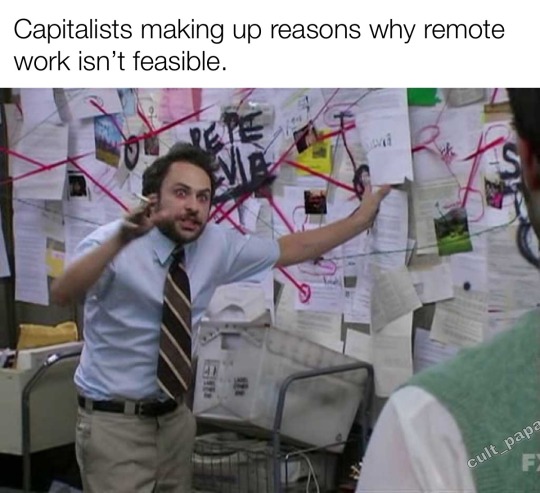
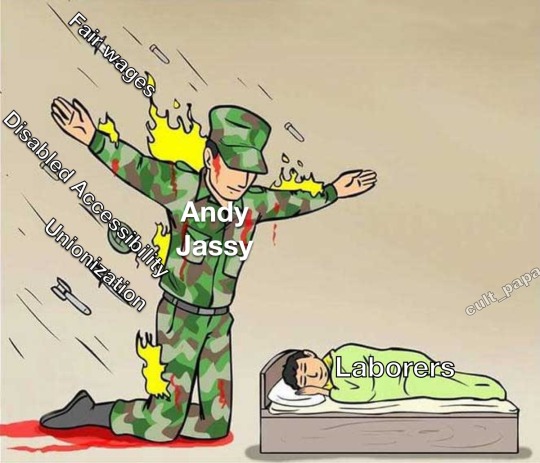

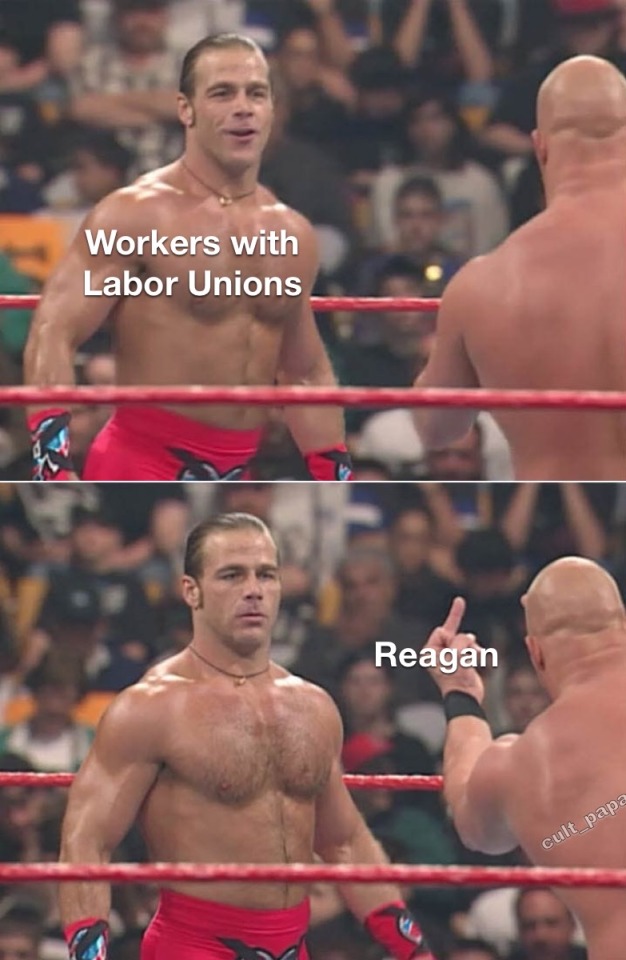
#workfromhome#substack#newsletter#memes#politics#amazon#andy jassy#why would I drive all the way to work to hop on a zoom call all by myself in a meeting room#pizza party or quit
0 notes
Text
Rep. Boebert was ejected from a family showing of Beetlejuice: The Musical — her date, an alleged democrat, runs a bar that has historically had Drag events. Interesting given Boeberts constant toxic rhetoric about drag queens and the gay community at large. Read more in my newest newsletter post.

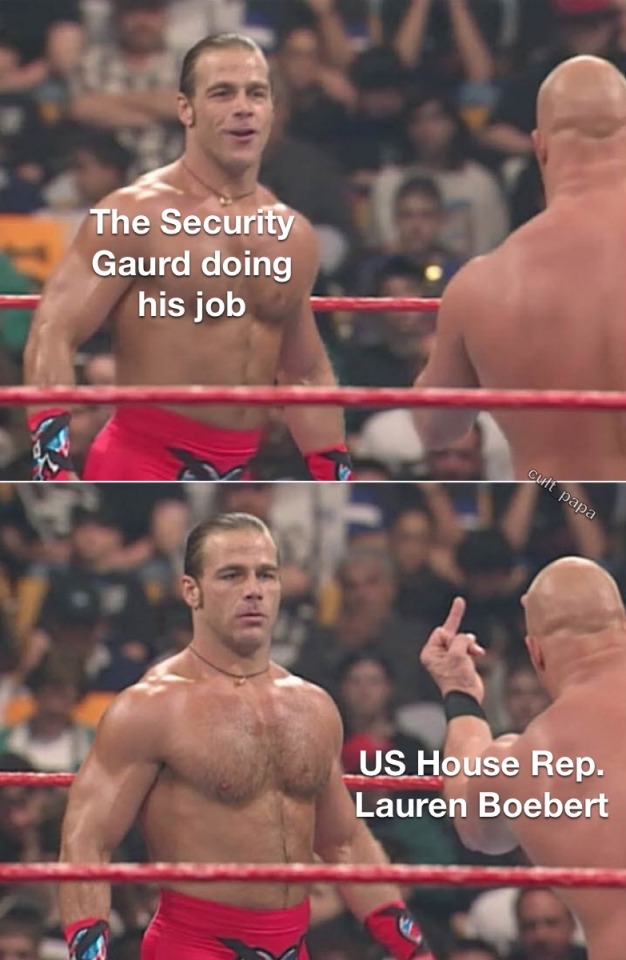


1 note
·
View note